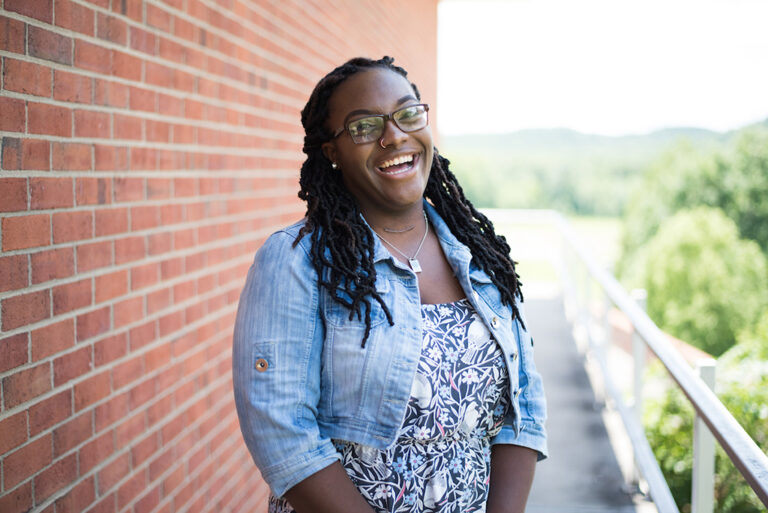In its early years, Berea’s enrollment reflected a nearly 50/50 split of black and white students. The 1904 passage of Kentucky’s devastating Day Law forced the College to segregate for nearly 50 years. The law was eventually set aside and then repealed with the landmark Brown v. Board of Education ruling in 1954. Since then, enrollment of African-American students has slowly but steadily increased, but will likely never reach the level of Berea’s initial mission.
Today, approximately 21 percent of Berea’s student body identifies as African American, and retention and graduation rates remain slightly behind those of other domestic students. To address this, Berea College launched the African American Opportunity Fund (AAOF) to help promote the recruitment and retention of African-American students.
“The most important reason to support the African American Opportunity Fund is to help continue Berea’s legacy of serving African-American students as well as all students of color,” said Carl Thomas ’78, associate director of admissions and coordinator of minority services. “We know students come to Berea with great challenges, and we need programs on campus that will help them to adjust to college life and experience. The AAOF program helps fund those efforts.”
[pullquote cite=”Maya Riddles ‘21″ type=”right”]I came to Berea because I saw opportunity where I did not see opportunity at any other school.[/pullquote]
The Carter G. Woodson Center for Interracial Education and its programs benefit from funding provided through the AAOF. The Black Male Leadership Initiative, T.R.U.T.H. Talks (True Racial Understanding through Honest Talks) Black Student Union, F.A.B.U.L.O.U.S. (Fierce Appropriate Beautiful Unique Love Outstanding Serious) and the Black Music Ensemble all are made possible through this new fund. Some of these programs, like F.A.B.U.L.O.U.S., which supports female students, are student-focused and designed to help African-American students gain a sense of belonging and, ultimately, succeed at the institution.
“This commitment [to the AAOF] is an opportunity for me,” said Aldrin Vinton ’18. “Berea College makes me feel like I’m worth it and that I can believe in myself.”
Other Fund-supported programs, like T.R.U.T.H. Talks are focused on the broader campus community and living out Berea’s fifth Great Commitment to “assert the kinship of all people.”
T.R.U.T.H. Talks are campus discussions about issues of race such as politics, immigration, police brutality and the history of the N-word. Students participating in these events are encouraged to be open and honest, and are provided an anonymous outlet to freely discuss these controversial topics with their campus community.
Thomas says the AAOF is key to investing in the lives of young, African-American students from cities and towns across Berea’s territory who just need an opportunity to discover their potential and act on it. He has been instrumental in the recruitment of minority students for 40 years.
Among them is Celeste Armstrong ’90, now a member of Berea’s Board of Trustees. She discovered Berea College through Thomas 31 years ago when he was her admissions counselor. Armstrong, like Thomas, is originally from the Birmingham, Ala., area. She studied philosophy while at Berea. After graduating, Armstrong went on to earn a Juris Doctorate from Samford University’s Cumberland School of Law in Birmingham. Today, she is the managing attorney in the Birmingham office of Nationwide Mutual Insurance Company’s Trial Division. She attributes her success to close mentorships and Berea’s cultural diversity. It motivates her to support the AAOF for other African-American students.
“Berea is a unique place,” Armstrong said. “The personal relationships I built with faculty and staff were a huge benefit. Meeting students from all around the world and forming true relationships with them gave me the opportunity to learn about a lot of different cultures. These experiences make students better-rounded and prepare them for the workforce.”
Armstrong says giving back to a fund that supports African-American students is important because of the unique challenges they face.
“The Fund helps provide support and resources for these students,” she said, noting both academic and social aspects of the support the College provides. “The Fund assists with all of those components necessary for college success.”
For Thomas, the ultimate success is graduation day.
“I like to see students who doubted themselves walk across that stage,” Thomas said. “There is a great significance to a school like Berea in the region for those students who have been told by someone that they’ll never make it, or who come from backgrounds where there has been very little success. They are discouraged [from attending college] because people want to protect them from failure. Those are students that can come here and thrive.”
For more information on AAOF and how you can get involved, visit the AAOF website.


